Learning in the flow of work is more than just a buzzword—it’s a transformative concept that, when actually experienced, can truly turn new insights into actual development. We’ve all felt the disruption of stepping away from our daily tasks for a training session or conference. While these traditional methods have value, they often lack immediate applicability.
When learning is truly in the flow of work, it shortens the time between insight and action. The integration of learning moments that are relevant to one’s work into their daily tasks, minimizes interruption. This continuous, contextual learning builds strength, awareness, and encourages a growth-oriented culture. The real impact of learning multiplies when it is actionable because it is timely. Theoretical knowledge can easily be forgotten in the busyness of work, but when learning translates into tangible, value-adding actions, it becomes indispensable.
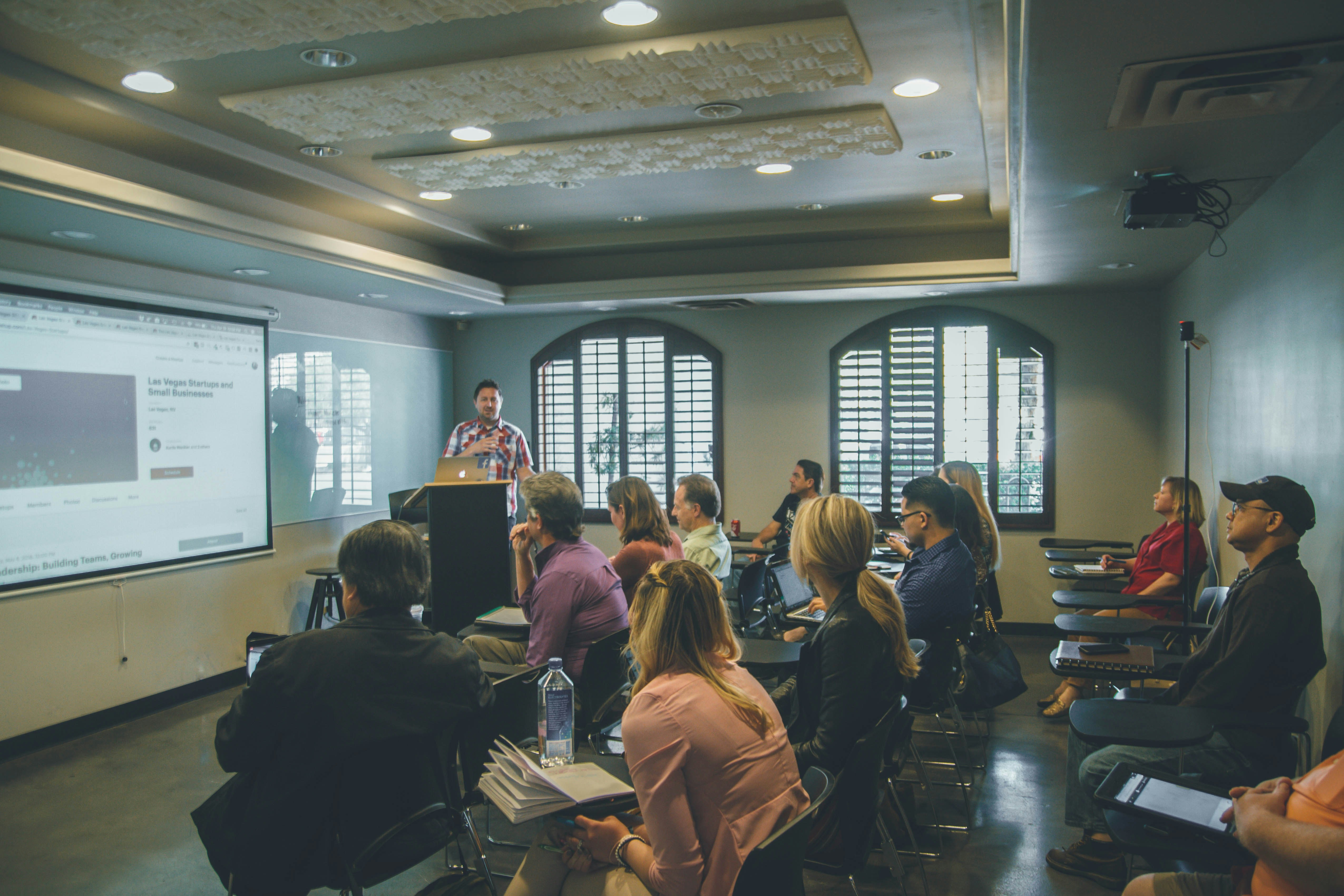
Why Learning In The Flow Of Work Is Still Broken
One of the biggest pitfalls of workplace learning is the misconception that it must be confined to traditional training sessions. In reality, learning can and should take many forms. Offering diverse channels and methods creates an engaging learning environment that resonates with a broader audience.
Consider the dynamics of a live or virtual learning session. Extroverts, thriving on group interactions, often dominate the conversation, actively participating and drawing energy from the experience. In contrast, introverts may find these settings draining, limiting their engagement and the value they derive (Cain, 2018).
Applying practical knowledge from traditional learning can be a significant challenge, especially without structure or accountability. Often, after a training session or course, people return to a mountain of emails and tasks, with catching up becoming their first priority. This scenario can lead to newly acquired knowledge being tucked away into one’s mental filing cabinet, rarely accessed again. This is where Hermann Ebbinghaus’s research on the Forgetting Curve comes into play. He found that people forget about 50% of new information within an hour and up to 90% within a week without reinforcement (Ebbinghaus, 1885). This insight underscores the need for continuous learning and regular reinforcement to make knowledge stick.
Traditional learning also struggles with personalization. While it can provide a broad understanding of topics and strategies, it often fails to meet individual needs effectively. This isn’t to undermine its value—it can spark meaningful discussions, help overcome challenges, and offer a refreshing break from daily routines. However, recognizing its limitations is crucial for evolving our approach and ensuring every learner finds their path to growth and success.
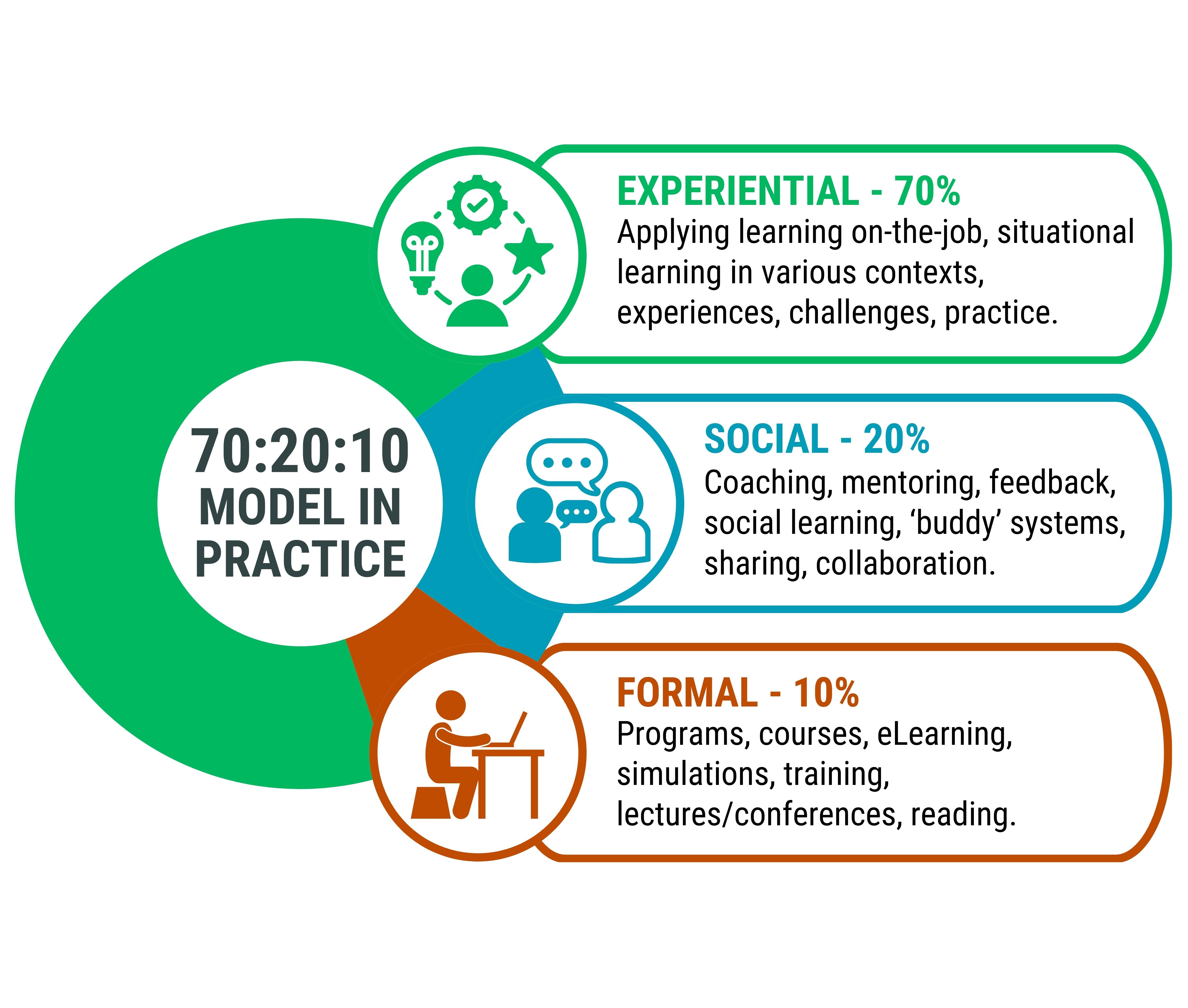
The Disconnect Between Learning and Development
On top of that, the 70-20-10 model of leadership development suggests that 70% of learning comes from on-the-job experiences, 20% from interactions with others, and only 10% from formal educational events (McCall, Lombardo, & Eichinger, 1996). As it turns out, gaining more knowledge is the smallest piece of the growth process. This familiar Talent Development model illustrates that the majority of development happens when
learning is applied in the day-to-day of work.
Learning in the flow of work doesn’t always translate into drag-and-drop self-paced courses or consuming short pieces of content in video or written format. These methods might not be personalized or tailored to individual needs.
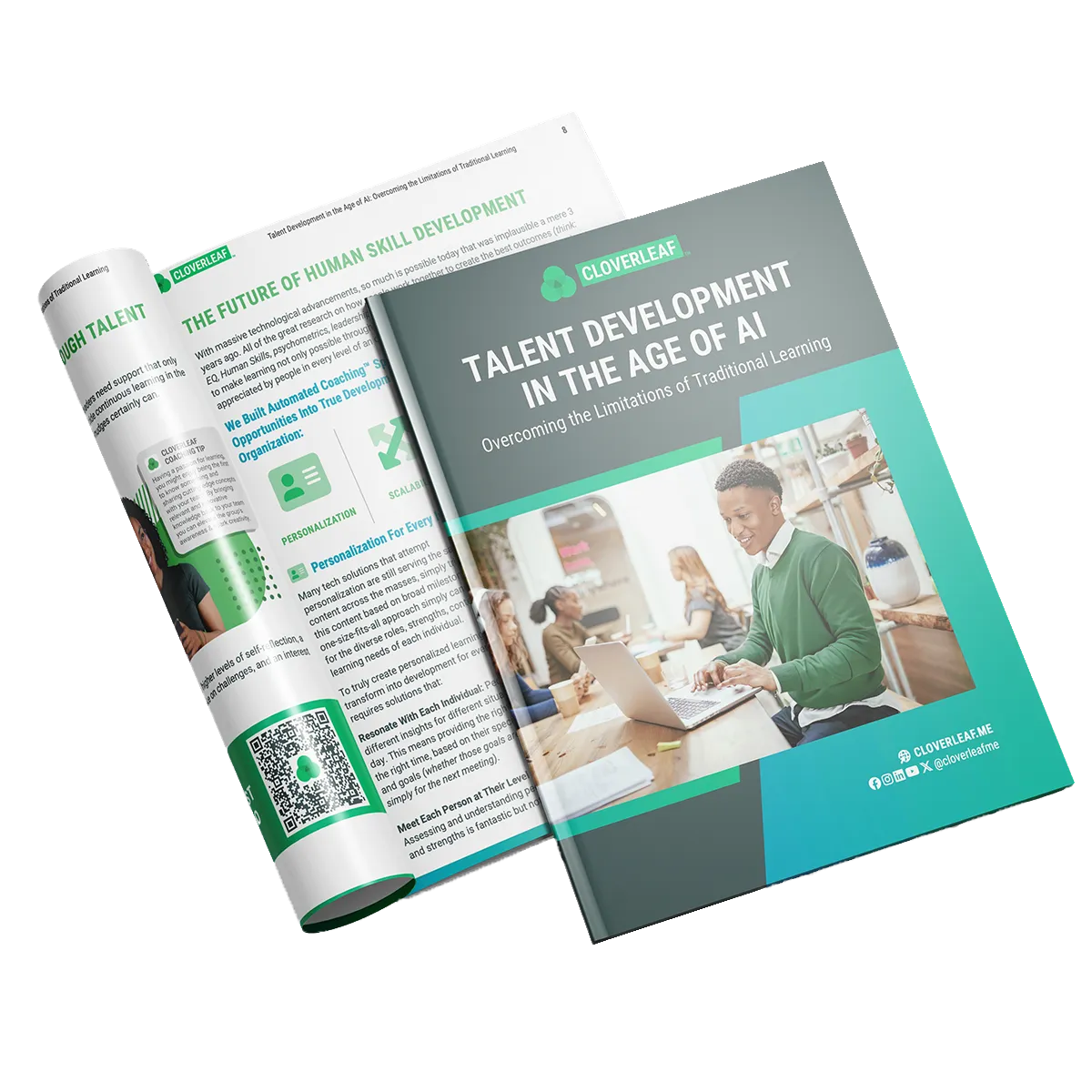
HUMAN SKILL PROGRAMS ARE HITTING LIMITATIONS...
- Close the widening gap between learning and on-the-job application
- Overcome the tension of pausing productivity for development opportunities
- Integrate learning so it is actually in the flow of work
- The evolution of human skill development
- What Automated Coaching™ is and how it works.
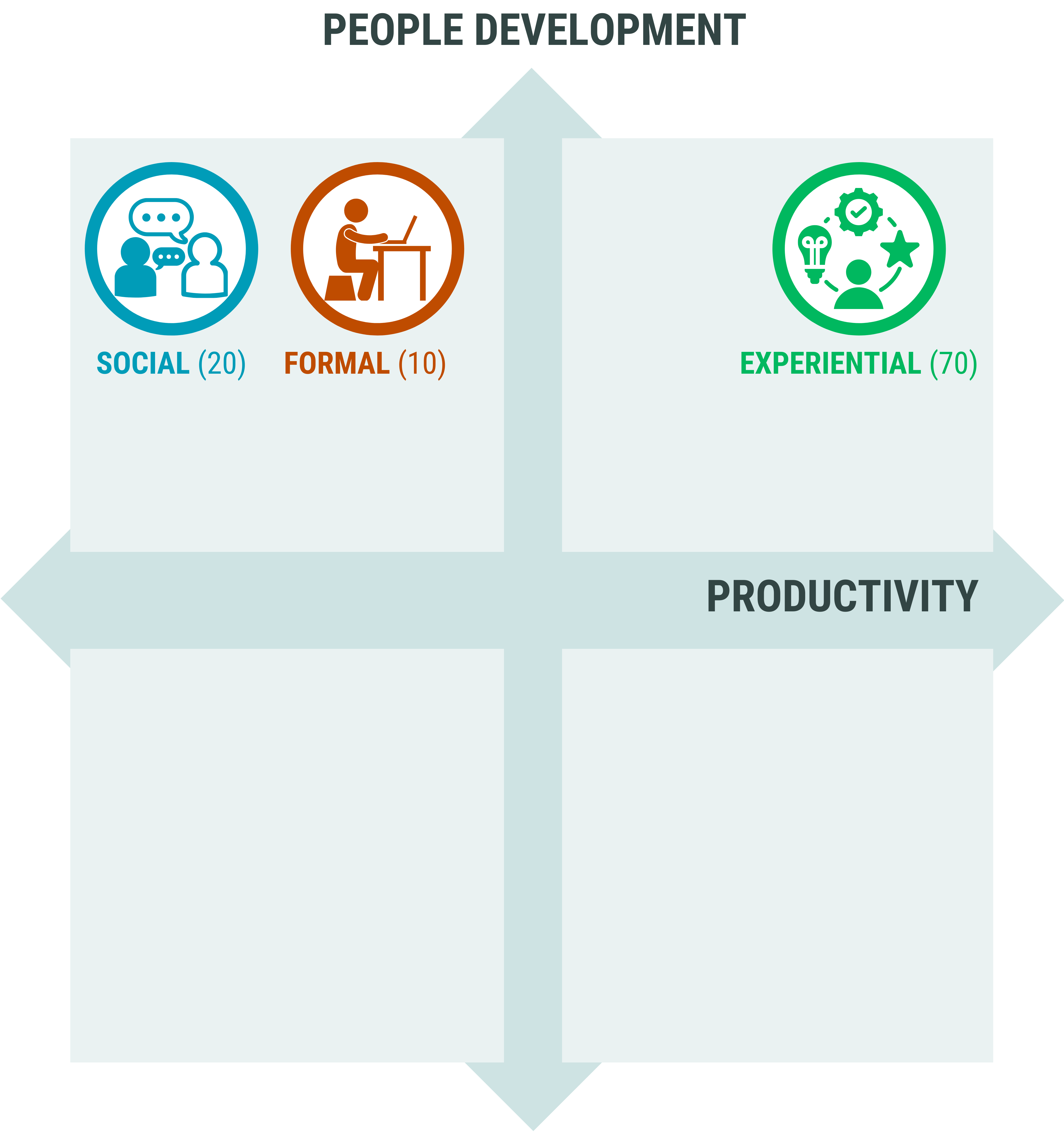
Learning In The Flow Of Work Must BE About The Individual & Their Context
Cloverleaf tackles these challenges head-on by providing personalized learning within the flow of work. This approach minimizes disruption and facilitates the immediate application of practical content, making learning stick. Learning retention increases dramatically when helpful information can be used right away.
For example, consider the power of Automated Coaching™. It requires just 1-2 minutes a day, allowing for quick reflection and application. This consistent source of personalized coaching makes learning concise, meaningful, and specific to their exact work situation. Over time, it builds the muscle of self and team awareness, enabling individuals to communicate and collaborate more effectively based on their natural strengths.
To truly maximize the impact of formal learning, Talent Development leaders need support that only technology makes possible. Human beings can’t possibly scale or provide continuous learning in the flow of work so that people can apply it, but AI coaching certainly can.
Cloverleaf ensures that learning is not just theoretical but practical and immediately relevant. We build Automated Coaching specifically with four pillars that turn learning opportunities into true development for everyone in an organization:
- Personalization
- Scalability
- Continuous Learning
- Proof of Impact
With massive technological advancements, so much is possible today that was implausible a mere 3 years ago. All of the great research on how people work together to create the best outcomes (think: EQ, Human Skills, psychometrics, leadership, collaboration, etc.) can now be partnered with technology to make learning not only possible through small daily moments, but actually attractive and deeply appreciated by people in every level of an organization.
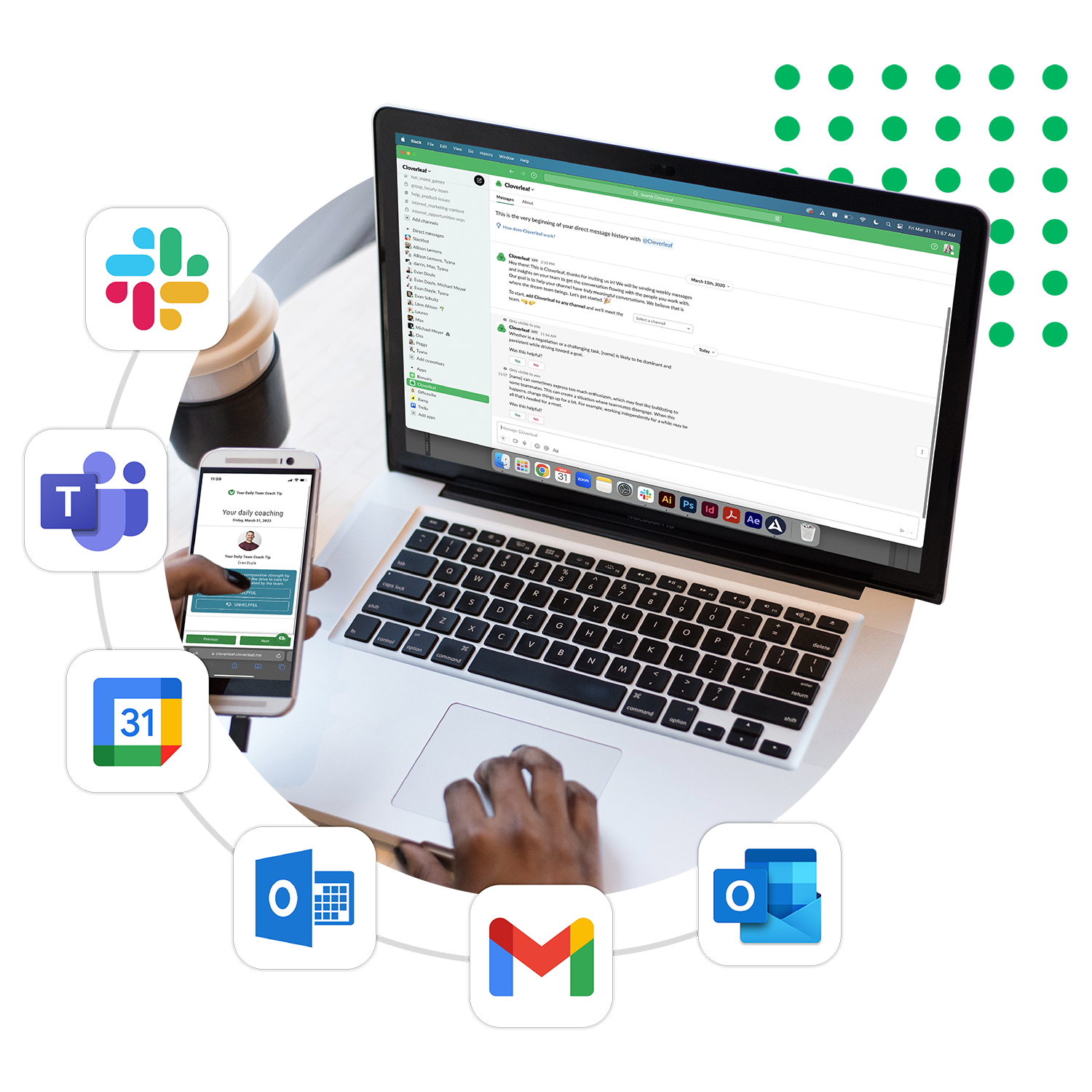
Effortless Learning Inside Your Favorite Tools
One way Cloverleaf makes learning so seamless is through its integration with tools that people already use every day. From email to MS Teams to Slack, Cloverleaf adds an extra dimension of intentionality to your day. As you look at a stacked day of meetings on your calendar, you might think you don’t have time to learn and develop. But by integrating your calendar with Cloverleaf, you’ll receive short, impactful tips about collaborating with who you are meeting, making preparation for conversations simple and personalized.
From Theory to Practice: Cloverleaf’s Impact
Cloverleaf’s Automated Coaching™ can also integrate into existing learning initiatives to help individuals absorb and apply learning to themselves and their teams. In a case study involving over 200 leaders, ranging from the C-Suite to first-time managers, participants learned coaching skills over six months with access to Cloverleaf.
Leaders met every other week for short, impactful coaching skills training and were then tasked with practicing these skills with their teams. Each day, participants engaged with automated coaching tips about themselves and their team members. Here’s how some participants reflected on how Cloverleaf supported their learning journey:
- Cloverleaf’s automated coaching has made me more self-aware of my listening style and how my conflict styles are to avoid potential pitfalls when talking with others.
- Understanding different personality types and how to communicate with them makes a huge difference in my conversations, especially when it comes to conflict.
- Cloverleaf gave me the confidence I needed to address challenging conversations with all the self-tips they gave me.
- By reading my coaching tips daily, it started my day thinking about coaching. I also use the tips about others I interact with to help me in my dealings with them so I find that very helpful.
- Cloverleaf sends me emails each morning with new content each day. I read them every morning and take them into my work day! They’ve been incredibly insightful and provided me with guidance I apply to myself. For example, sometimes I defer to others and their thoughts rather than my own. Cloverleaf reminded me of this and provided guidance on how to find opportunities to give my thoughts!
These reflections from users highlight how Cloverleaf makes a real difference. By including personalized coaching in their daily routines, leaders were able to strengthen their self-awareness, improve communication, and handle challenging conversations with more confidence. This brief snapshot of user experiences indicates individual growth and a more collaborative and effective team environment. The spot-on insights and daily tips ensure that learning is continuous, actionable, and deeply personalized.
The Future of Workplace Learning Is Personalization and Relevance
To stay ahead of the learning curve and effectively develop a multi-generational workforce, learning and people strategy leaders must embrace innovative approaches to integrating learning into the flow of work. This means shifting the focus from broad, generalized content to personalized, relevant learning experiences that cater to diverse needs and preferences.
Today’s workforce includes many individuals who have grown up with technology as an integral part of their educational experience. Traditional learning methods, designed before the digital era, often fail to meet the expectations and habits of this tech-savvy generation. According to the 2024 Workplace Learning Report by LinkedIn Learning, there is a significant shift towards personalized and flexible learning solutions to meet modern employees’ expectations. Therefore, it is crucial to reevaluate learning strategies and ask, How are we addressing the learning needs of today’s workforce?
Providing learning opportunities within the flow of work is becoming increasingly essential, especially in an environment where many teams are hybrid, remote, or dispersed. The Deloitte Insights report on the future of work in technology highlights the importance of integrating continuous learning into daily work processes to keep up with rapid technological advancements and changing workforce dynamics. It emphasizes that learning in the flow of work enhances employee engagement and productivity.
Incorporating learning into the flow of work not only keeps organizations competitive but also supports the growth and success of a diverse and dynamic workforce. It’s time to move beyond traditional learning models and adopt strategies that meet the evolving needs of today’s employees.
For more information about how Automated Coaching is a powerful microlearning tool, download: Talent Development In The Age Of AI: Overcoming the Limitations of Traditional Learning







